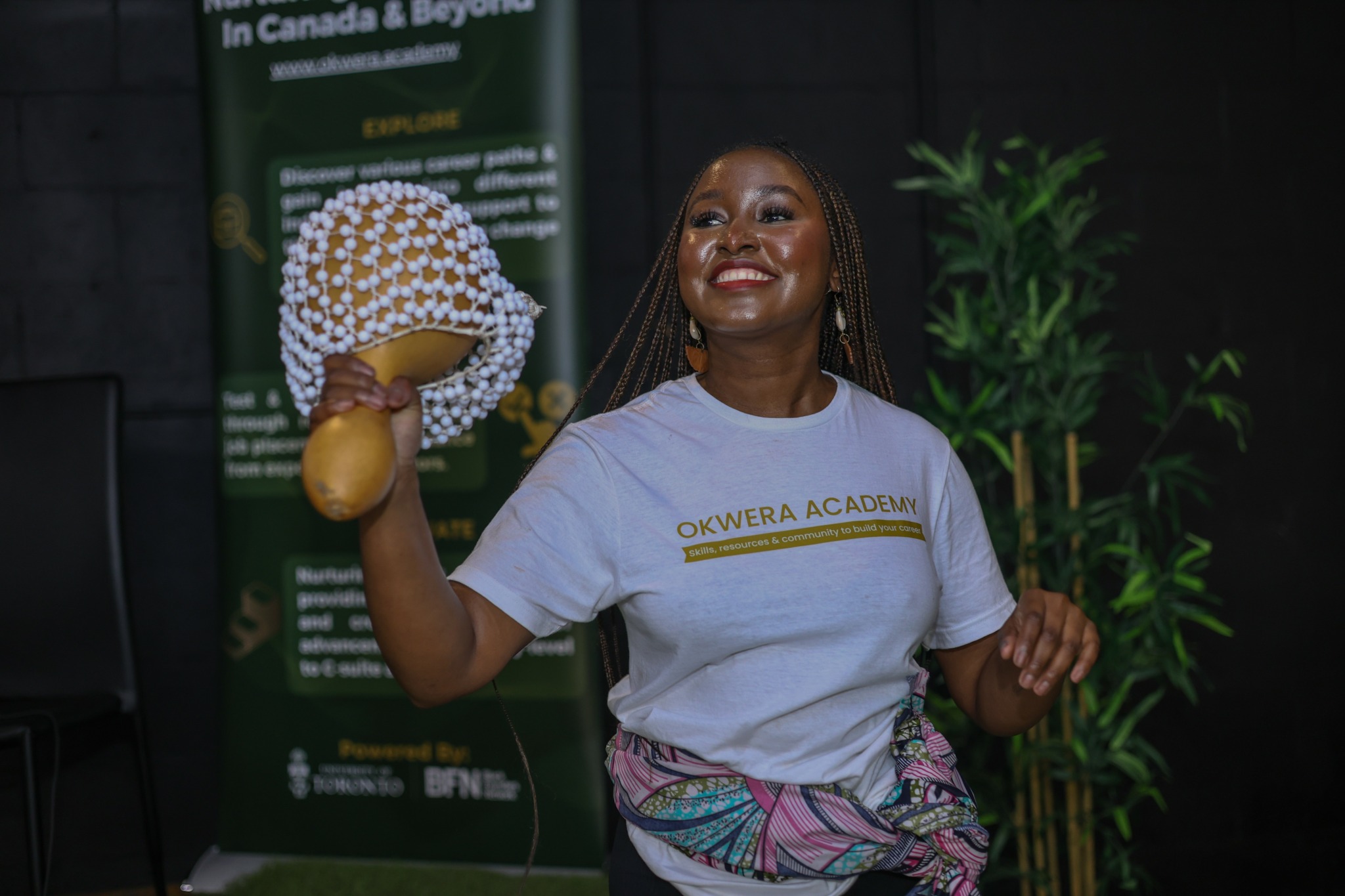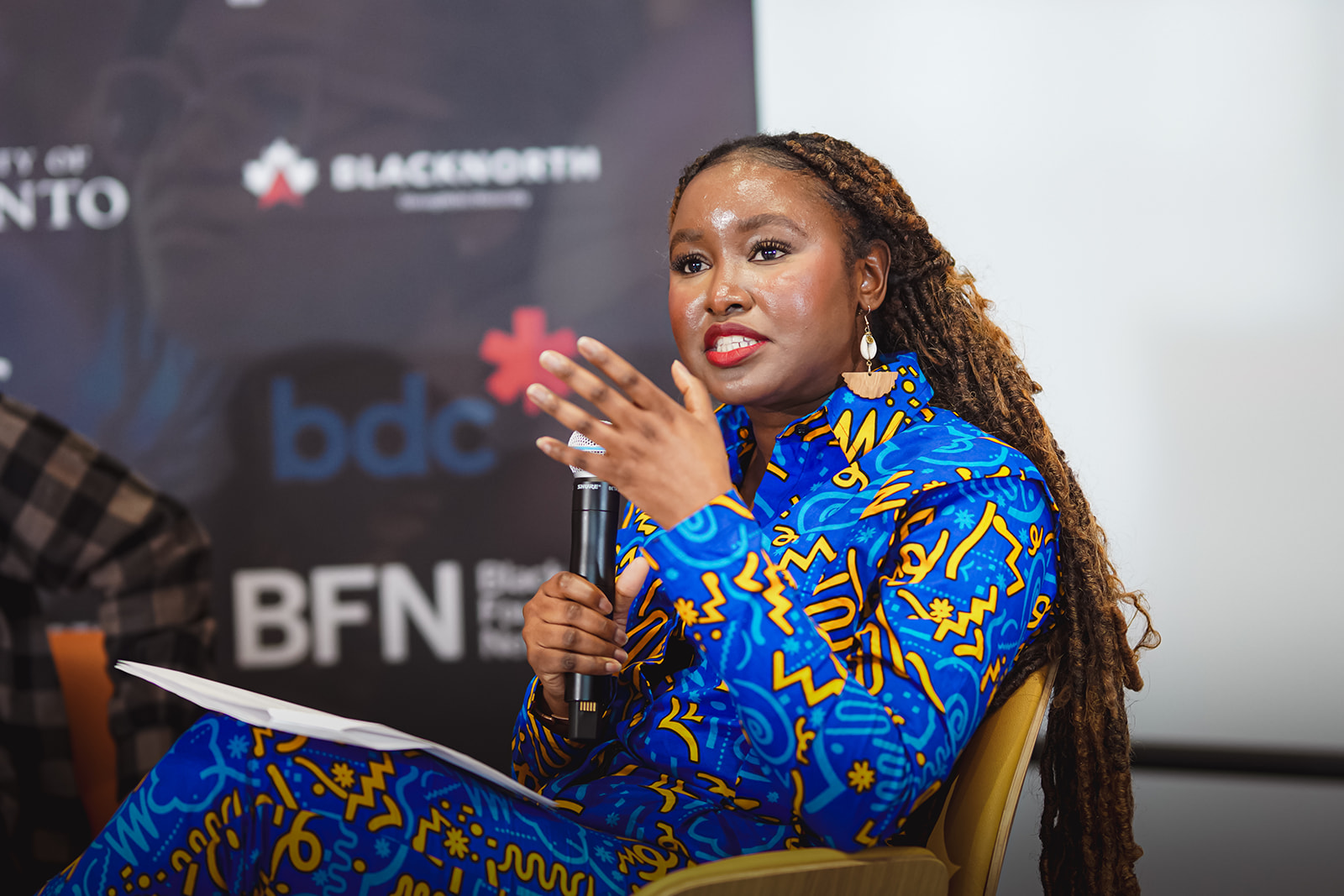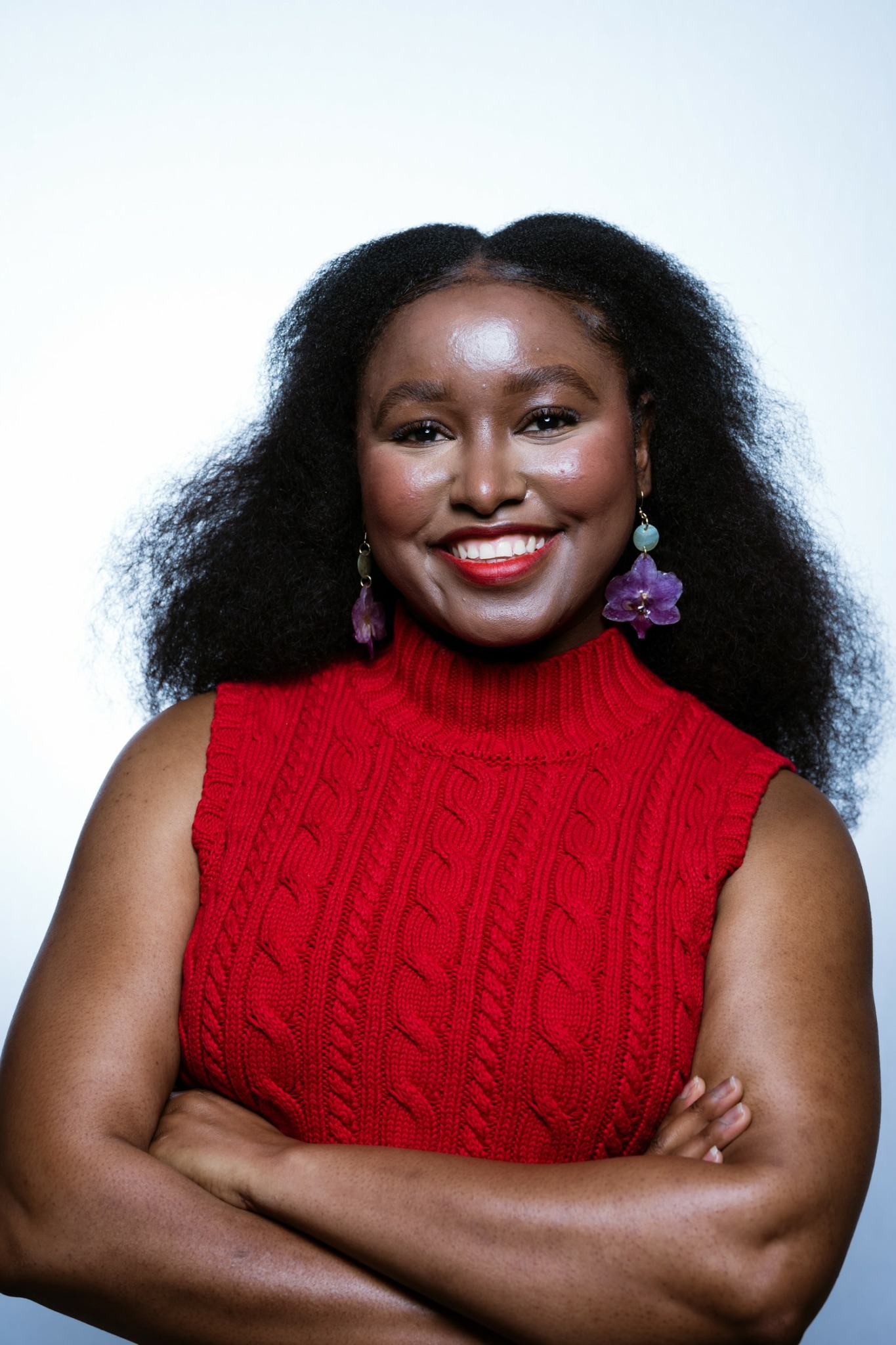We were lucky to catch up with JUSTINA KANZA recently and have shared our conversation below.
Hi JUSTINA, thanks for joining us today. Let’s start with education – we’d love to hear your thoughts about how we can better prepare students for a more fulfilling life and career
If I could change one fundamental aspect of the education system to better prepare students for a more fulfilling life and career, it would be to explicitly recognize, value, and cultivate the diverse forms of capital that students from all backgrounds, especially students of colour, bring to the table.
For too long, our education system has often operated under a deficit model, implicitly or explicitly valuing certain cultural norms and knowledge while marginalizing others. This can leave students from marginalized communities feeling that their lived experiences, their cultural knowledge, and their unique strengths are not relevant or valued in academic or professional settings. We need a paradigm shift that acknowledges the richness and power of what Dr. Tara Yosso terms ‘cultural wealth’ – the aspirational, linguistic, social, resistant, navigational, and familial capital that students (of colour) possess.
My own educational journey at the University of Toronto vividly illustrates the need for this change. As a young Zambian immigrant navigating a completely new academic and cultural landscape, I initially struggled immensely. The system wasn’t built with my prior educational experiences or cultural understanding in mind. I felt inadequate, on academic probation, and at risk of losing the very scholarship that brought me there. It wasn’t a lack of intelligence or drive; it was the challenge of navigating an unfamiliar system without the right tools and frameworks.
What turned things around for me was mentorship, specifically from the Director of the African Studies Centre, Professor Marieme Lo. She saw beyond my initial struggles and recognized the unique perspectives and strengths I brought. She helped me connect my passions and lived experiences to my academic and professional pursuits, ultimately leading me to African Studies where my lived experience became an asset, not a deficit. This experience highlighted the transformative power of recognizing and valuing a student’s unique cultural capital. Had the broader system been more attuned to identifying and nurturing these diverse strengths from the outset, I believe my initial years wouldn’t have been marked by such struggle and self-doubt. Every student, particularly those navigating systemic barriers, deserves this kind of culturally intelligent guidance.
It is by identifying and leveraging these forms of capital that I was able to transition from being a struggling international student at the University of Toronto to now being a Founder and Executive Director of a career accelerator for Black individuals, Okwera Academy, and a Tech Startup GRANTED.
This experience taught me a crucial lesson: our cultural capital is not just relevant to our personal lives; it is a powerful and often untapped asset in the professional world. Think about it:
– Aspirational Capital: The drive and resilience honed by overcoming obstacles translate directly to perseverance and goal-oriented behavior in the workplace. Employers value individuals who don’t give up easily.
– Linguistic Capital: Multilingualism and the ability to code-switch are increasingly vital in our globalized economy, fostering better communication and connection with diverse clients and colleagues.
– Social Capital: Strong community ties and networks provide access to opportunities, mentorship, and invaluable industry connections.
– Resistant Capital: The skills developed through challenging inequalities – advocacy, critical thinking, problem-solving – are essential for driving innovation and creating more equitable workplaces.
– Navigational Capital: The ability to navigate complex systems translates to adaptability, resourcefulness, and the capacity to thrive in diverse organizational cultures.
– Familial Capital: The values, work ethic, and support systems nurtured by family and community provide a strong foundation for professional responsibility and resilience.
Imagine an education system that equips students with the language and frameworks to understand and articulate these forms of capital as their career superpowers – skills that are not only valuable today but are inherently future-proof.
In a world where technology and AI will reshape industries in ways we can’t fully predict, these core human-centric skills – the ability to connect, adapt, persevere, critically think, and navigate complexity – will be the enduring differentiators.
Imagine workshops and career counseling that specifically guide folks on how to leverage their lived experiences as people of colour to navigate different social and technological environments, strengthen their critical thinking by analyzing societal challenges, leverage their networks in evolving industries, and articulate the resilience they’ve built through overcoming obstacles as a key strength for navigating future uncertainties.
By focusing on these foundational aspects of cultural capital, we equip students not just for the jobs of today, but for the unpredictable landscape of tomorrow. By integrating the understanding and strategic application of cultural capital into the education system, we can also empower individuals from marginalized backgrounds to not only lead more fulfilling lives but also to enter the workforce with a distinct advantage. They will understand their inherent value, be able to articulate their unique strengths, and ultimately contribute to more diverse, innovative, and successful organizations like I’ve been able to do. This isn’t just about social justice; it’s about unlocking untapped talent and fostering a more robust and equitable professional landscape – a message I am passionate about and that drives our work at Okwera Academy.


Great, appreciate you sharing that with us. Before we ask you to share more of your insights, can you take a moment to introduce yourself and how you got to where you are today to our readers.
My path has been one of both challenge and profound discovery, a journey that has ultimately led me to dedicate my life to empowering others. It began in Zambia, where I was raised as one of five girls. From a young age, I witnessed the resilience and entrepreneurial spirit of my father, who, despite operating within a system that didn’t always support small businesses, carved out his own path. This instilled in me a deep understanding of the power of resourcefulness and determination – qualities that would later become central to my own journey.
I never dreamed of studying abroad because no one in my sphere of influence was living that reality; so it wasn’t in my realm of reality. My initial dream was simple: pursue a law in Zambia, get married, have kids and that’s it.
However, a different opportunity arose that would change the course of my life. I saw a couple of distant cousins get scholarships and all of a sudden I believed that could be my reality too! Despite the financial constraints my family faced, and the seemingly distant nature of this dream, I was driven by an unwavering belief that I could make it a reality. I began to pursue opportunities to study abroad including knocking on embassy and consulate doors in Longacres, a neighbourhood in Lusaka Zambia, armed with my high school results and a self-made CV and asking for scholarships . I would sell Dashiki (African print) shirts to get capital to cover my costs associated with this. This experience, marked by both aspiration and a need for resourcefulness, ultimately led to me being awarded the MasterCard Foundation Scholarship to study at the University of Toronto.
My arrival in Toronto at the age of 18 was a stark transition. Navigating a new country, a new culture, and a completely different education system, I found myself struggling. I moved between programs feeling lost and disconnected. For the first time, I, who had always been a strong student, was facing academic probation and at risk of losing my scholarship. It wasn’t a lack of ability, but a lack of understanding how to navigate this new terrain.
It was during this time that I met Professor Marieme Lo, the Director of the African Studies Centre. She became more than just a mentor; she became a guiding force. Professor Lo recognized the value in my lived experience as a young African woman, helping me to reframe my challenges and see my cultural background not as a deficit, but as a source of strength. She helped me connect my academic pursuits to my passions and my inherent drive, and she opened doors for me to explore leadership opportunities and independent research.
One of those research opportunities, focused on entrepreneurship in the African context, ignited a passion that would ultimately shape my career. I began to see the threads connecting my father’s, and my own, entrepreneurial journey, the resilience of the communities I came from, and my own growing interest in empowering others.
Even before graduating, I began to put some of these lessons into practice, starting with Okwera Recruitment Firm, connecting companies in North America with top tier talent across the globe. Through this firm, I encountered a frustrating pattern: talented Black professionals were consistently being overlooked for opportunities, not because of a lack of skill, but because they struggled to articulate their value in a way that resonated with mainstream hiring practices. I realized that the same challenges I had faced in navigating the university system were playing out in the professional world, but on a much larger scale.
This realization led me to found Okwera Academy. Okwera Academy is a career accelerator specifically designed to empower Black individuals with the tools, resources, community, and coaching they need to advance in their careers. We focus on providing capital – not just financial, but also social and cultural – capacity building, and fostering a strong sense of community. We recognize and actively address the significant educational and employment disparities faced by Black communities despite comparable educational attainment. As highlighted by Statistics Canada in January 2021, the unemployment rate for Black Canadians (13.1%) was a staggering 70% higher than that of non-visible minorities (7.7%). This stark reality underscores the systemic barriers we are committed to dismantling.
Our Approach is national in scope, understanding and addressing the unique needs of diverse Black sub-communities across Canada through a locally-specific lens. We address the significant educational and employment disparities faced by Black Canadians through essential resources, mentorship, skill development, and financial support.
Our Work is structured through three flagship programs designed to support Black Canadians at every stage of their career journey:
– Explore: This program provides guidance and support for individuals exploring career options, helping them gain industry insights, build foundational skills, and discover their professional passions.
– Validate: Focusing on practical skill development and validation, this program offers real-world projects, internships, and mentorship opportunities to refine skills and meet industry demands.
– Elevate: This program caters to established professionals seeking career advancement, providing tailored resources, mentorship from industry leaders, and advanced skill development opportunities.
What sets my work apart is the deeply personal connection to the challenges faced by the Black community, combined with a practical, solutions-oriented approach. My own journey, from navigating a new country and education system to witnessing the barriers in entrepreneurship and career advancement, fuels my commitment to creating tangible pathways to success for others. This has been the foundation of my ethos and “brand” if you will – empowering others with the tools and resources to navigate these barriers and ecosystems.
I was also able to do this in my role at University of Toronto Entrepreneurship’s Black Founders Network where I served a vibrant community of over 5,000 Black entrepreneurs across Canada. At BFN, our work centered on providing crucial Capital, Capacity Building, and Community support. It was an incredibly impactful experience, allowing me to witness firsthand the ingenuity and drive within the Black entrepreneurial ecosystem.
However, I also saw a recurring and significant challenge: access to funding. Despite their innovative ideas and strong business acumen, many entrepreneurs face systemic barriers in securing the financial resources needed to scale and thrive. This deeply resonated with my own early experiences of limited resources and fueled a desire to create a tangible solution.
This firsthand understanding of the funding gap led me to found GRANTED (grantedtech.ca). GRANTED is a tech startup with a mission to democratize access to funding. We are building a platform that streamlines the grant application process, connecting founders, including those often overlooked by traditional funding avenues, with a diverse range of funding opportunities. Our platform offers tools for grant discovery, provides insights into funder priorities, leverages AI to assist with grant writing, and automates grant management, ultimately aiming to level the playing field and empower more individuals and organizations to secure the resources they need to bring their visions to life.
I am most proud of the resilience and brilliance within the Black community that Okwera Academy and, I hope, GRANTED serve. Seeing individuals gain the confidence to articulate their value, secure meaningful opportunities, and build thriving ventures is the driving force behind my work.
Ultimately, I want potential clients, followers, supporters and anyone who comes across me to know that my brand and my work are rooted in a deep belief in empowerment, equity, action, and community. We are building a future where [Black] talent is not only recognized but celebrated and where the gap between talent, access, opportunity and success are bridged. Resources should never be a barrier to innovation and impact and through my work, I’m making sure that it’s not.


Can you open up about how you funded your business?
Securing the initial capital for my ventures, particularly Okwera Academy and now GRANTED, highlights a significant challenge faced by many aspiring entrepreneurs.
For Okwera Academy, the early stages required a resourceful and lean approach. Sure, we got a couple of $3,000 grants here and there, but funding was primarily achieved through personal savings from prior employment, strategic reinvestment of revenue generated by my recruitment firm, Okwera Recruitment, and the invaluable support of my professional network. This social capital proved crucial in accessing pro-bono services and building initial momentum. A key pro tip for any aspiring entrepreneur is to leverage what you already have and start where you are. Don’t underestimate the power of your existing networks – friends, family, former colleagues – as they can often provide invaluable support, connections, and even initial resources. While bootstrapping requires dedication, tapping into your social capital can significantly ease the initial burden and open doors that might otherwise remain closed.
However, while this bootstrapping model allowed Okwera Academy to take its first steps, it also underscored the considerable hurdles faced by small business owners, especially those from marginalized communities, who may lack substantial upfront capital.
My experience navigating the early growth of Okwera Academy, coupled with my subsequent role at the Black Founders Network, provided a deeper understanding of these financial barriers. At BFN, I worked with over 5,000 Black entrepreneurs across Canada and consistently observed the critical need for accessible funding to fuel their innovative ventures. This firsthand exposure revealed a significant disconnect between the talent and ingenuity within the entrepreneurship ecosystem and the availability of financial resources.
A key insight gained during this period was the often-untapped potential of grant funding. While frequently associated with non-profit organizations, substantial grant opportunities exist for small businesses and creatives. In Canada alone, about $37 billion is distributed annually through various grant programs. However, the landscape can be complex and challenging to navigate, often acting as a deterrent for those who could greatly benefit.
This understanding of both the need and the existing opportunities led to the creation of GRANTED (grantedtech.ca). GRANTED is a tech startup designed to democratize access to funding by streamlining the grant application process. Our platform aims to connect a wider range of ventures, including those historically underserved, with relevant grant opportunities, providing tools for discovery, insights into funder priorities, AI-assisted application support, and simplified grant management. The vision behind GRANTED is to lower the barrier to entry for vital financial resources, enabling more small business owners and creatives to realize their potential and contribute to a more vibrant and equitable economic landscape.
This time around, when starting GRANTED, I made a conscious effort to walk the talk and leverage the very grant opportunities we aim to democratize. In under three months, even with our product still in development, we’ve successfully secured almost $10,000 in grant funding, which is now serving as our crucial seed capital. This tangible experience underscores the immense potential of grants and is precisely the challenge we’re determined to solve for other aspiring businesses and creatives through GRANTED.


Are there any books, videos or other content that you feel have meaningfully impacted your thinking?
One book that has significantly impacted my management and entrepreneurial thinking is “The Lean Startup” by Eric Ries.
Before encountering “The Lean Startup”, my approach to building ventures, including both Okwera Recruitment and, even more significantly, Okwera Academy, was characterized by a deep dive into planning and a fixation on what I now recognize as often trivial details. I spent countless hours obsessing over brand colors, perfecting website designs, and getting caught up in a pursuit of perfectionism that, in hindsight, was often procrastination in disguise.
With Okwera Academy, this tendency was particularly pronounced. I envisioned a fully polished and comprehensive offering right from the start. This led to a year-long delay between the initial idea and the full launch. That was a year spent in the shadows of planning, a year where I could have been out there learning directly from potential users, pivoting based on real-world feedback, and iterating our services to truly meet the needs of the community we aimed to serve. That year, in essence, was a missed opportunity for validated learning – a core tenet of “The Lean Startup” that I hadn’t yet grasped.
Ries’s methodology completely shifted that perspective. It introduced me to the power of building a Minimum Viable Product (MVP) – or even an early prototype – to test core assumptions quickly and iteratively, incorporating customer feedback at every stage. This concept was particularly transformative in the development of GRANTED. Instead of spending months building a fully featured platform based on our initial assumptions about the grant funding landscape, the Lean Startup framework encouraged us to identify our core hypotheses – for example, the specific pain points users experience in finding and applying for grants – and then develop a basic prototype to get early feedback from potential users. We’re obsessed with our customers and talked to over 20 of them in less than a week to understand their painpoints. This allowed us to gather invaluable insights, pivot our approach when necessary, and ensure we were building a product that truly addressed their needs.
Furthermore, the emphasis on validated learning – the idea of rigorously measuring progress through actionable metrics and using that data to inform future decisions – has become a cornerstone of my management philosophy. It encourages a culture of experimentation, where failure is seen as an opportunity to learn and refine our approach. This is crucial in the fast-paced and often unpredictable world of startups. In fact, I’ve become a staunch advocate for “speedy execution” and what I now call having an “execution bias.” Ideas are cheap, and in today’s world, so is planning, especially with AI tools that can generate a comprehensive plan in seconds. The real differentiator is execution. It’s about getting out there, gathering real-world feedback and data, and building relationships with customers while your competitors are still stuck in the planning phase. I now live by and am known for the mantra: “Fail fast, fail forward.”
The Lean Startup’s emphasis on validated learning also played a crucial role in securing our early grant funding for GRANTED. Because we had learned from the past and adopted a rapid iteration cycle, constantly gathering user feedback on our prototype, we were able to articulate a clear problem-solution fit in our grant applications. We weren’t just pitching a perfect, but untested, idea; we were presenting a solution that was being actively shaped by real user needs. This data-driven approach contributed significantly to securing almost $10,000 in grant funding within our first three months, even before a fully built MVP was launched. It allowed us to demonstrate early traction and the viability of our solution to potential funders, providing the seed capital we needed to continue building GRANTED with a clear understanding of user needs – a stark contrast to the year of planning that preceded Okwera Academy’s full launch.
Contact Info:
- Website: https://grantedtech.ca/
- Instagram: https://www.instagram.com/justina.shuli/?hl=en
- Linkedin: https://www.linkedin.com/in/justina-k-857624114/
- Youtube: https://www.youtube.com/@TheOkweraPodcast
- Other: Spotify: https://open.spotify.com/show/6CDTKhjcaWs3MNMgcF1oQk?si=G7vx2sBdQUWcdVLPawd3gQ




